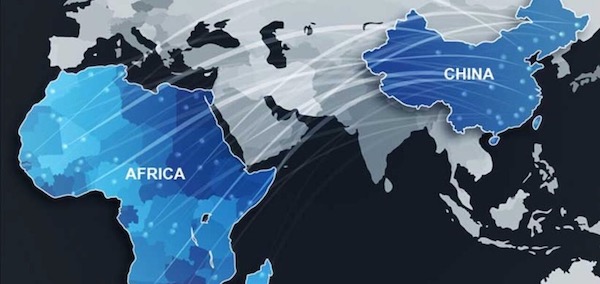Those that call China a colonizer of Africa don’t understand colonization.
The following interview was published on April 8th as part of Black Alliance for Peace’s AFRICOM Watch Bulletin (AWB) issue no. 25, which can be found here .
AWB: To what do you attribute the misconceptions about China in Africa?
Danny: The biggest misconception about China in Africa is the predominantly Western argument that China is the “new colonizer” in Africa. This is problematic on many levels. For one, China and Africa share a common history in that each has been on the receiving end of Western and U.S.-led imperialism for much of their modern existence. As Western colonial powers were colonizing and dividing Africa amongst themselves in the late 19th century, so too were these same powers occupying parts of China and fueling mass migration to the U.S. where racist laws were implemented to maintain their super exploitation and ultimate exclusion.
Furthermore, there is a lack of evidence for the claim of “colonialism.” Colonialism is the economic, political, and social domination of one nation upon another and is the engine of the Euro-American imperial project. None of China’s relations with Africa can be described as such. Does China control the monetary policy of 14 African countries as France does? Does China use its military and political system to control the governance structures of African societies? The answer is always no, but the Western and US corporate media have called China a “new colonizer” in Africa so many times it has been digested as truth.
Deborah Bräutigam is the Director of the China and Africa Research Initiative at John Hopkins University, hardly an anti-establishment source of information. Yet her observations, based on field research into Chinese investment in Africa, demonstrate that much of the financial and economic relations between China and Africa serve a real infrastructure need and make up a small portion of the African continent’s overall debt portfolio. I would encourage readers to review this op-ed in The Washington Post and read her book “The Dragon’s Gift: The Real Story of China in Africa.”
AWB: Are there connections between how China is viewed in Africa and America and the indifference to the spike in anti-Asian violence in America?
Danny: Most definitely. Corporate media celebrity comedian Bill Maher expressed the connection clearly when, in a monologue berating the United States for focusing too much on social issues (identity politics) rather than “real problems,” he remarked that “China bought Africa.” China is viewed as an invading force and an all-powerful one at that. A Yellow Peril 2.0 has emerged where the Western populace is driven by the fear that the colonial spoils accumulated over the course of centuries of imperialist plunder are at risk of being taken by China. This fits nicely with the larger U.S.-led New Cold War at the center of the ruling class’ varied attempts to stabilize and defend the imperialist world order from ongoing decline through an intense but unsuccessful focus on stopping China’s economic growth.
Every day, Americans and Westerners are fed a daily dose of reasons to fear China in the corporate media. We are told China is invading Africa, stealing intellectual property and jobs, interfering in elections abroad, stifling freedom within its own borders, building up militarily in the South China Sea and on and on. This barrage of propaganda has spurred the largest dip in public opinion toward China since relations normalized between Washington and Beijing nearly fifty years ago. Such an intense atmosphere of Cold War racism and anti-communism coupled with a global pandemic and economic depression is bound to inspire the most reactionary and racist elements of society. We cannot understand the rise of violence toward people of Asian descent outside of this context.
AWB: What are some steps that those in Africa or America can do to reduce those misconceptions?
Danny: Political education will be key. China cannot and will not be bullied by the United States or the West, and this will continue to drive the imperialists to ever more desperate acts of violence and sabotage against China. These acts will reverberate and impact greatly the futures of the Global South, especially Africa. We are seeing how the long legacies of racism and anti-communism have made it attractive to join in the crusade against China along humanitarian interventionist lines, even among some sections of the so-called “democratic” socialist left.
There are two kinds of political education that we must engage in to counter the strength of New Cold War propaganda. The first is study. We must study the Chinese perspective(s), the African perspective(s), and the various perspectives of nations and movements across the world on this issue. We must then make firm conclusions about where the true problem resides. That is, in the endless war drive of the imperialist world system and its lust for private profit.
The second is experience. We must engage directly in the struggle for peace and develop relationships with Chinese, African, and all non-aligned forces worldwide to truly understand the situation. My short trip to China in 2019 and early 2020 was deeply informative on the immense achievements made by a country once dominated by Western imperialism. We will need to organize people to people exchanges that help us answer questions which cannot be answered in books. The imperialists want us divided, and they want Americans and Westerners no matter how “progressive” or “radical” to look upon the Chinese as inherently corrupt and incapable of determining their own destiny or even understanding their own interests. This narrative should be familiar because its roots lie in the same racist social order that continues to oppress and exploit Africans on the African continent and in the imperialist core.
Lastly, it is important to join anti-imperialist organizations. Join Black Alliance for Peace, participate in the No Cold War campaign, and begin working with those already engaged in efforts to dispel imperialist propaganda and develop solidarity among the oppressed. We all have a role.

